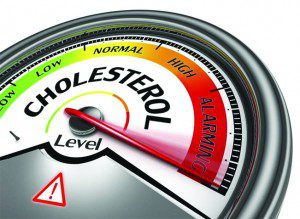By Elizabeth Meyer, MAEd, BSN, RN – Manatee Technical College
 Since September is National Cholesterol Education month, it’s time to think about getting screened in order to live a longer and healthier life. According to the Centers for Disease Control and Prevention, 73.5 million adults in the United States have high cholesterol and of those fewer than one out of 3 have it under control.
Since September is National Cholesterol Education month, it’s time to think about getting screened in order to live a longer and healthier life. According to the Centers for Disease Control and Prevention, 73.5 million adults in the United States have high cholesterol and of those fewer than one out of 3 have it under control.
Cholesterol is made by the body and is needed for all of our cells to function. Unfortunately, high levels of certain cholesterol can lead to heart disease and stroke, the two leading causes of death in the United States. This is why it’s important to know about cholesterol, what your levels are and what you can do to have healthy cholesterol levels.
There are different types of cholesterol in the body including the “bad” cholesterol or low-density (lousy) lipoprotein or LDL. This builds up on the walls of arteries making them hard and narrow. When a person has a high cholesterol level it is LDL that is the culprit.
The “good” cholesterol is high-density (happy) lipoprotein or HDL. This helps remove LDL from the arteries so it can go to the liver where it is broken down and then removed from the body.
There are no symptoms of high cholesterol. The only way to know if you have it is to have a simple blood test. This can be done through your doctor’s office or clinic. Sometimes, pharmacies, health expos, insurance companies or employers offer free or discounted tests.
The risk factors for high cholesterol include:
. Eating foods high in saturated fats such as meat and full-fat dairy products and trans fats such as in some commercially prepared cookies and crackers.
. Obesity –A Body Mass Index (BMI) of greater than 30. You can find out what your BMI is by going to http://www.nhlbi.nih.gov/health.
. Lack of exercise- Being physically active increases the HDL or good cholesterol.
. Smoking damages the blood vessels of the body making it easier for the LDL to accumulate. It also may lower the good cholesterol, HDL.
. Diabetes can increase LDL and decrease HDL in the bloodstream, and high blood sugar damages blood vessels.
. Family history of high cholesterol as it may be genetic.
Adults should be screened starting at the age of 20 and then every five years or more often depending on the results. Some medical professionals recommend children be screened once between ages 9 and 11 and again between ages 17 and 21.
Prevention and Treatment
. Find out your cholesterol levels and if elevated work with your health care provider for monitoring.
. Follow a healthy diet and know which fats to avoid and which fats to use since not all fats from foods are bad.
. Lose weight if in the overweight range.
. Become active by increasing your physical activity with permission from your doctor
. Quit smoking
. Medication may be necessary to decrease the total cholesterol level. Statins are a group of medications widely prescribed.
Be aware of misconceptions that many people have. A common misconception is thin people don’t have high cholesterol. High cholesterol does not discriminate, and anyone of any size can have it. Another is, if a person is on cholesterol medication they can eat whatever they want. It is a combination of taking the medication and following a healthy lifestyle that decreases the risk of developing complications of heart disease and stroke.
The recommended total cholesterol level is less than 200 mg/dL and HDL greater than 40 mg/dL. Do you know your cholesterol numbers? Now would be a great time to find out.
Beth Meyer is a nursing instructor at Manatee Technical College in Bradenton, Florida. She is a Florida Registered Nurse. She earned her Bachelor of Science in Nursing from the University of Florida and her Master in Education degree from Argosy University. Beth has been teaching in the practical nursing program at MTC since 1998. Prior to joining MTC, she worked as an intensive care and home health nurse.
The practical nursing program at Manatee Technical College takes about 13 months (full-time) to complete. Students are prepared to pass the NCLEX, which is the national licensing exam to become a Licensed Practical Nurse (LPN). The school’s pass rate on the exam is 89%, and the job placement rate is 98%. Graduates may earn an advanced placement option or up to 10 credits toward an Associate of Science degree in Nursing at Florida state colleges.
For more information, please visit http://ManateeTech.edu.









